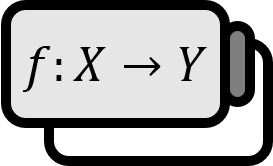Legendre Polynomials are orthogonal to any lower degree polynomial
Theorem
When $P_{l}(x)$ is a Legendre Polynomial and $f(x)$ is any polynomial of lower degree than $l$, then $P_{l}(x)$ and $f(x)$ are orthogonal to each other.
$$ \int_{-1}^{1}P_{l}(x)f(x)dx = 0 $$
Explanation
The following lemma is essentially equivalent to the proof of the theorem.
Lemma
Let $f(x)$ be any polynomial of degree $n$. $f(x)$ can be expressed as a linear combination of Legendre polynomials up to degree $l \le n$.
Proof
$P_{l}(x)$ is a polynomial of degree $l$. Therefore, the highest degree term of $P_{n}(x)$ and a product of any constant can represent the $n$th degree term of $f(x)$. Also, the product of the $x^{n-1}$th term of $P_{n}(x)$ and a constant can be added to the product of any constant and the highest degree term of $P_{n-1}(x)$ to express the $n-1$th degree term of $f(x)$. By continuing this method and moving down in order, even the constant term can be expressed. Therefore, it can be understood that $f(x)$ can be represented as a linear combination of Legendre polynomials.
■
Proof
Let $f(x)$ be any polynomial of degree $n(\lt l)$. The inner product of $P_{l}$ and $f$ is as follows.
$$ \int_{-1}^{1}P_{l}(x)f(x) dx $$
By the lemma, expressing $f(x)$ as a linear combination of Legendre polynomials is as follows.
$$ \begin{align*} & \int_{-1}^{1} P_{l}(x)\big[ a_{n}P_{n}(x)+a_{n-1}P_{n-1}(x) + \cdots +a_{0}P_{0}(x) \big] dx \\ &= a_{n}\int _{-1}^{1}P_{l}(x)P_{n}(x)dx +a_{n-1}\int _{-1}^{1}P_{l}(x)P_{n-1}(x) dx +\cdots+a_{0}\int _{-1}^{1}P_{l}(x)P_{0}(x)dx \\ &= 0 \end{align*} $$
Given that $l \ne n$ and by the orthogonality of Legendre polynomials, all terms are $0$.
■
